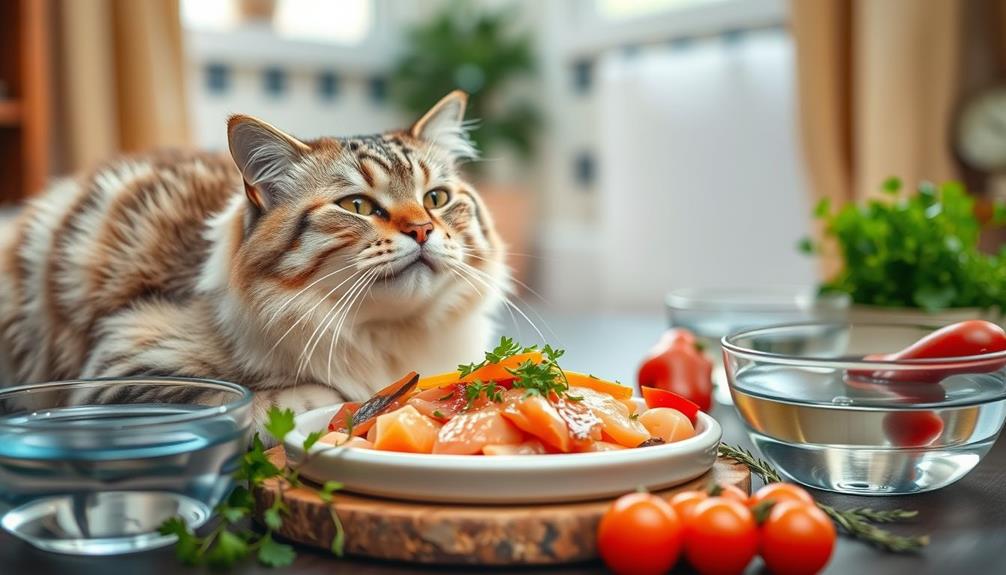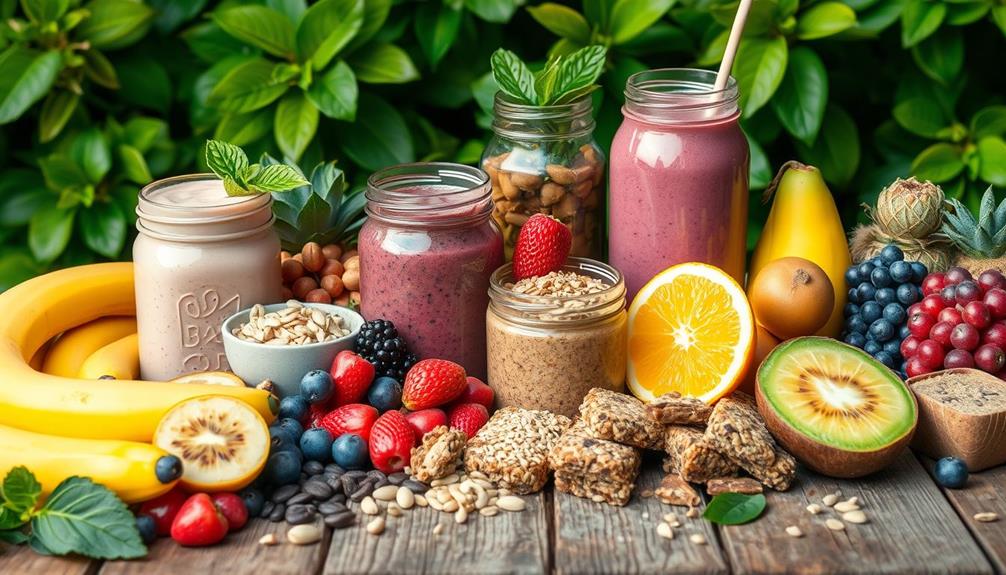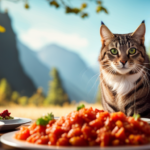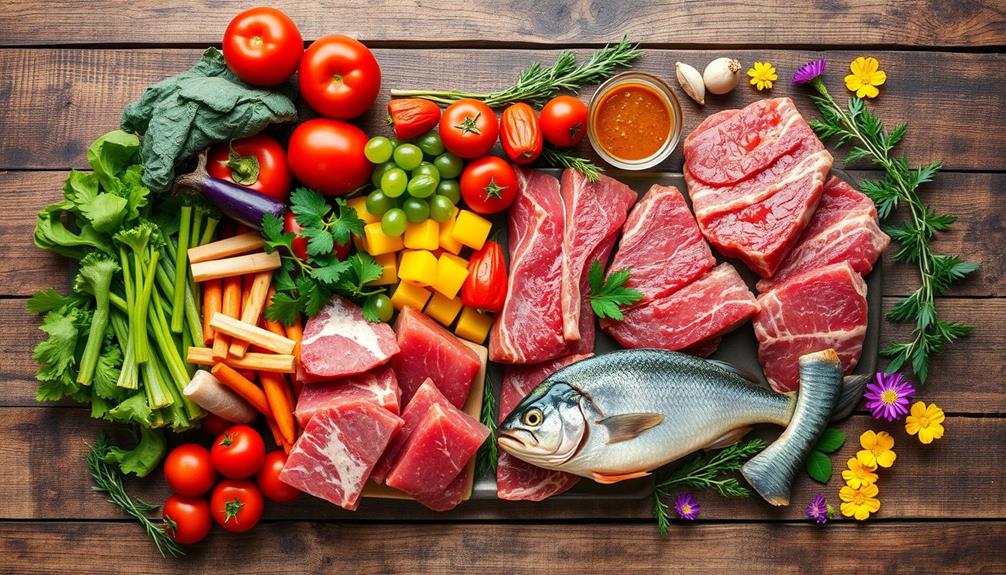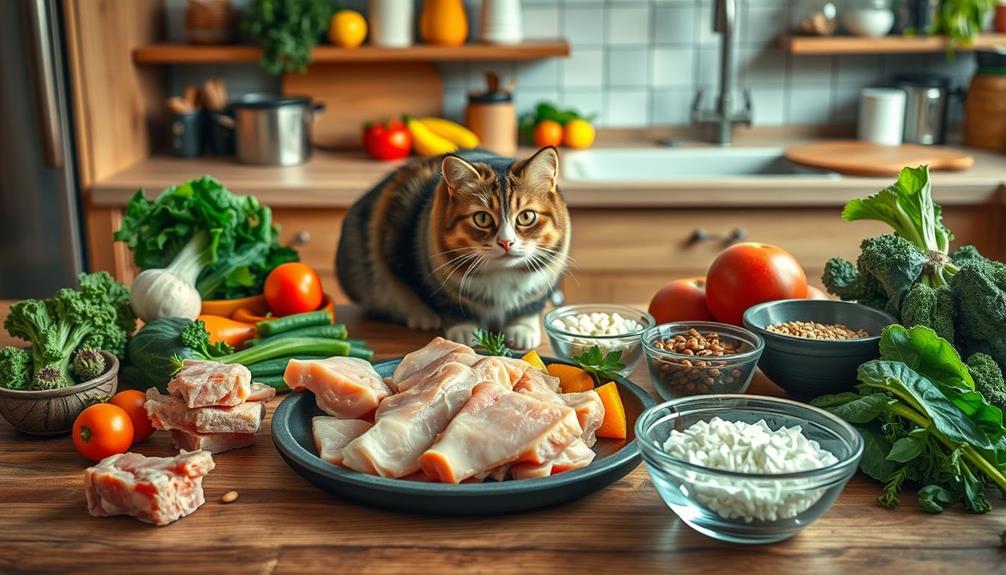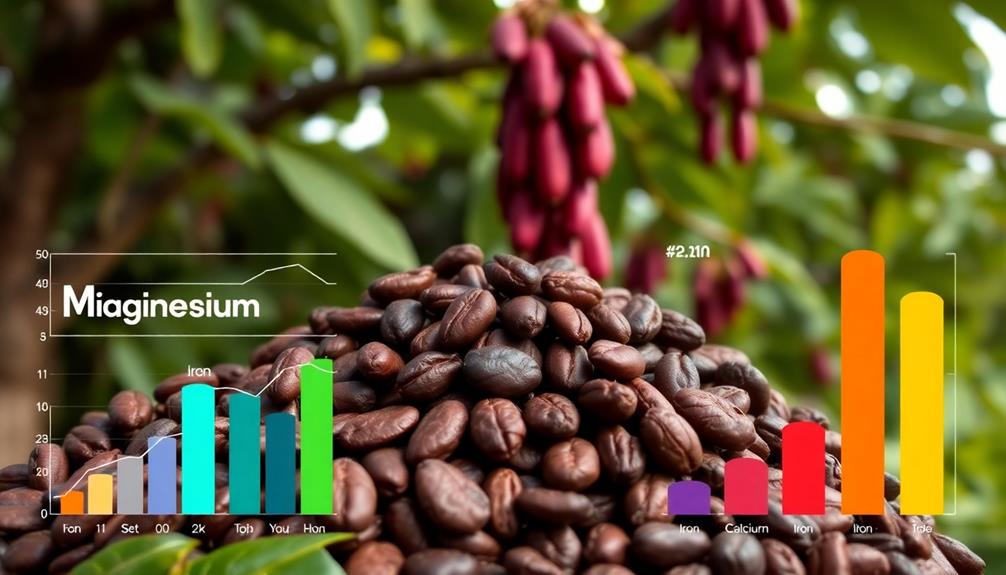Raw food can be a great choice for cats with urinary crystals. Its high moisture content helps keep your cat hydrated, which is essential for flushing out urinary minerals. Many experts believe raw diets promote an acidic urine pH, reducing the risk of struvite crystals. Additionally, high-quality proteins support overall health and reduce obesity, lowering urinary issues. However, be sure to shift your cat gradually and consult your veterinarian to guarantee nutritional balance and prevent any health risks. If you want to understand more about effectively managing your cat's diet, there's plenty more to explore. There are numerous raw food options for cats available, including commercial raw diets or homemade raw food. It’s important to do thorough research and consider the specific dietary needs of your cat before making the switch. You may also want to consider incorporating additional supplements or probiotics into your cat’s raw food diet to ensure they are getting all the necessary nutrients for optimal health.
Key Takeaways
- Raw food diets are high in moisture, promoting hydration and reducing the risk of urinary crystal formation in cats.
- High protein content in raw diets helps maintain acidic urine, which can prevent struvite crystal formation.
- Veterinarians recommend raw diets for managing urinary health but emphasize gradual transitions to avoid digestive issues.
- Regular monitoring of urine pH and veterinary consultations are essential for cats on raw diets to prevent complications.
- High-quality animal proteins and low carbohydrates in raw diets align with a cat's natural dietary needs, supporting overall health.
Understanding Urinary Crystals in Cats
Urinary crystals in cats can be a serious health concern, and understanding their formation is vital for prevention. These crystals, primarily struvite and calcium oxalate, can develop due to an unbalanced diet, dehydration, and urinary pH imbalances.
Struvite crystals form in alkaline urine, where the pH exceeds 6.5, while calcium oxalate crystals thrive in more acidic environments. Proper hydration plays a key role in preventing urinary crystals, and the significance of hydration can't be overstated. You should guarantee your cat drinks about 60ml of water per kilogram of body weight daily. This helps to flush out excess minerals and maintain urinary health.
If your cat exhibits symptoms like difficulty urinating, blood in the urine, or frequent attempts to urinate without producing any, it's important to act quickly.
Feline idiopathic cystitis (FIC) complicates matters, accounting for 60% of urinary disease cases. Managing your cat's diet is essential not only for preventing crystal formation but also for reducing inflammation associated with FIC.
The Role of Diet in Urinary Health
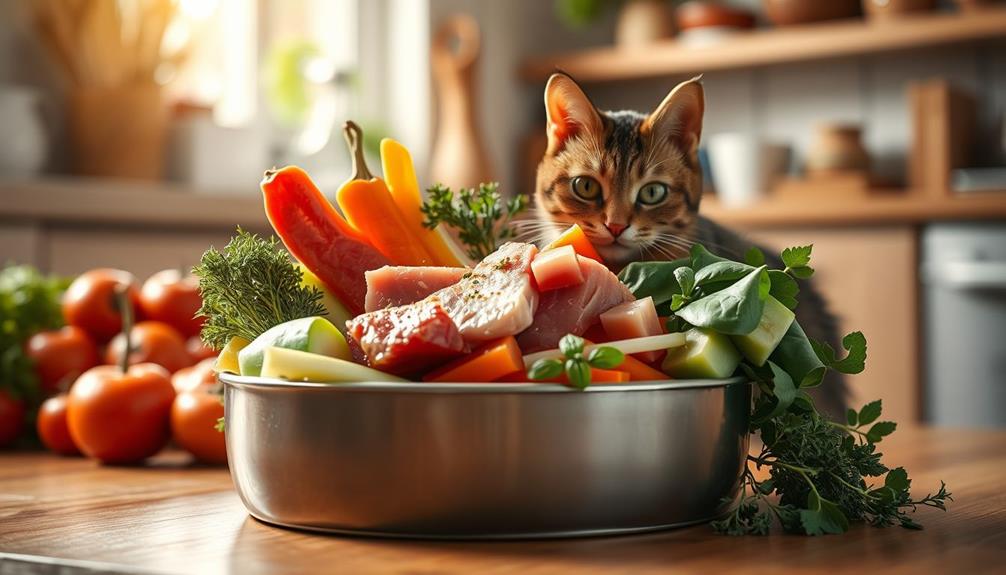
A well-balanced diet plays a fundamental role in maintaining your cat's urinary health. A raw diet, known for its high moisture content, can markedly reduce the risk of urinary crystals by keeping your cat well-hydrated. Proper hydration promotes ideal urinary tract function, helping to flush out minerals that might otherwise contribute to crystal formation.
Additionally, it's important to monitor your cat's overall well-being, as proper diet guidelines can further enhance their health.
Raw diets typically result in more acidic urine, which is beneficial in preventing struvite crystals, a common urinary issue in cats. Including animal proteins in their diet supports a balanced nutrient intake, essential for maintaining healthy urinary pH levels.
This balance is crucial for overall urinary health and helps minimize the concentration of minerals in your cat's urine, further reducing the likelihood of urinary blockages.
If you're considering a raw diet for your cat, it's important to shift gradually and seek veterinary guidance. This guarantees that the diet meets your cat's specific needs, especially if they're prone to urinary issues.
Benefits of Raw Food for Cats
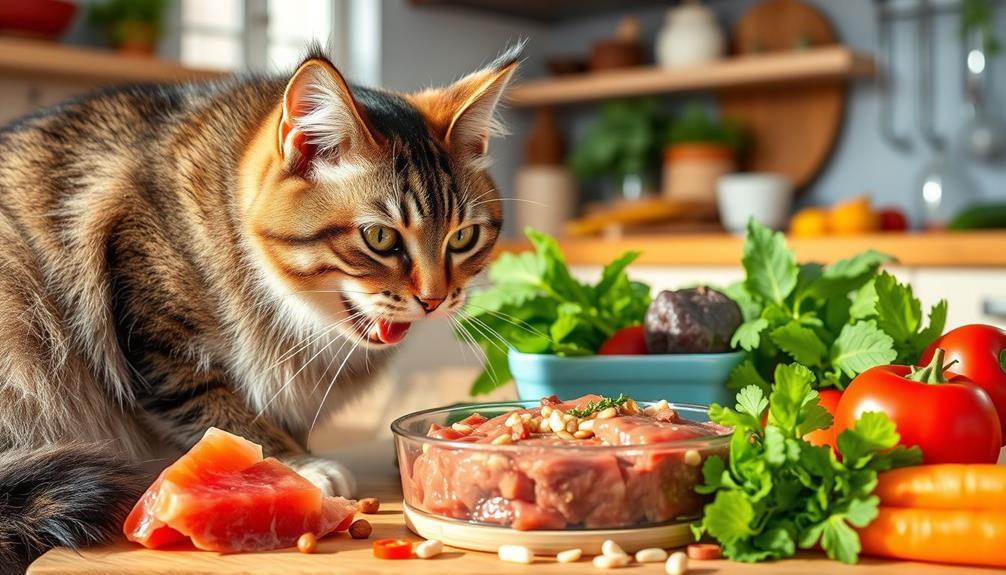
The benefits of raw food for cats are numerous, particularly when it comes to their overall health and well-being. A raw food diet is high in protein and low in carbohydrates, making it an excellent choice for managing weight and preventing obesity, which is linked to urinary issues. The rich moisture content in raw diets promotes hydration, encouraging more frequent urination that helps flush out minerals, thereby reducing the risk of urinary crystals.
| Benefit | Description | Impact on Urinary Health |
|---|---|---|
| High Protein | Supports acidic urine pH | Prevents struvite crystal formation |
| Hydration | Increased moisture content | Promotes frequent urination |
| Low Carbohydrates | Reduces obesity risk | Lowers likelihood of urinary issues |
Incorporating raw meaty bones can also enhance dental health, reducing inflammation and supporting urinary tract health. With high-quality animal proteins, a raw food diet guarantees that your cat gets the essential nutrients needed for ideal kidney and urinary function. Overall, adopting a raw food diet can considerably benefit your cat's urinary health and contribute to their overall vitality.
Expert Opinions on Raw Diets

Many veterinarians and pet nutrition experts advocate for raw diets as a viable option for managing urinary crystals in cats. They believe that these diets can promote more acidic urine, which may reduce struvite crystal formation. The high moisture content found in raw food is essential for hydrating your cat, helping to flush out minerals that contribute to urinary issues.
Additionally, raw diets can provide a rich source of antioxidants and vitamins, which are beneficial for overall health, similar to the health benefits associated with Cranberry Juice Consumption.
Veterinary professionals often highlight that raw diets typically contain higher levels of animal protein and lower carbohydrates, which aligns with a cat's natural dietary needs. This alignment can potentially lower the risk of urinary crystals, making a raw diet an appealing choice for many cat owners.
However, it's vital to monitor your cat's urine pH regularly when converting to a raw diet. Excessively low pH levels can lead to the development of calcium oxalate crystals, which can complicate your cat's health.
Many vets recommend introducing raw food gradually while ensuring a balanced diet. This gradual introduction helps avoid nutrient deficiencies, allowing you to address urinary health concerns effectively while supporting your cat's overall well-being.
Always consult with a veterinary professional before making significant dietary changes.
Nutritional Balance and Cat Health

Maintaining nutritional balance is vital for your cat's health, especially when it comes to preventing urinary crystals. A well-rounded diet can greatly reduce the risk of urinary tract infections and guarantee your feline thrives.
Incorporating a variety of fresh foods can promote overall wellness and enhance hydration levels, which is essential for urinary health. Consider these key points:
- Raw pet food typically offers high-quality animal proteins, important for feline diets.
- A diet rich in moisture content helps maintain ideal hydration levels.
- Nutritional imbalances from commercial dry foods can lead to the formation of crystals.
- Regular monitoring of your cat's urine pH allows for tailored dietary adjustments.
Switching to a raw diet can help you achieve this balance. Raw food generally contains the necessary protein and moisture content required to maintain urine acidity, effectively preventing the formation of struvite crystals.
Additionally, incorporating high-quality animal proteins guarantees your cat receives essential nutrients, supporting overall health.
For further insights on effective strategies for weight loss, consider how dietary changes can impact your cat's overall well-being.
Hydration and Urinary Well-Being

Ensuring your cat stays hydrated is essential for their urinary well-being. A raw food diet, with its high moisture content of 60-80%, plays a significant role in maintaining hydration. This increased fluid intake helps flush out minerals that contribute to the formation of urinary crystals, particularly struvite crystals, which thrive in concentrated urine.
By promoting ideal urine dilution, you reduce the risk of urinary tract issues. Additionally, incorporating herbs like essential oils for respiratory health can support overall wellness, including hydration through their soothing effects.
Moreover, raw diets can improve urinary pH levels, making your cat's urine more acidic. This environment is less favorable for struvite crystal formation, further supporting urinary health.
Chronic dehydration is a known risk factor for urinary problems, but a moisture-rich diet like raw food can help prevent it.
Potential Risks of Raw Feeding

Raw feeding can seem like a natural choice for promoting your cat's health, but it comes with potential risks that you need to contemplate. Here are some key concerns:
- Bacterial contamination: Raw diets can harbor pathogens like Salmonella and E. coli, affecting both your cat and your household. Proper handling and storage of food, akin to how butter storage and freshness is essential for quality, is important to mitigate these risks.
- Nutritional balance: Homemade raw diets often lack essential nutrients, leading to deficiencies or excesses that can worsen urinary crystals.
- Dehydration: Without adequate moisture, raw diets can contribute to dehydration, complicating urinary health.
- Kidney strain: High protein levels can overload the kidneys, raising concerns for cats with existing urinary crystals or renal issues.
When considering raw feeding, it's important to consult with your veterinarian. Shifting without professional guidance might overlook your cat's unique health needs.
This is especially significant for cats with pre-existing conditions, as improper management can exacerbate health concerns.
Remember, achieving a proper nutritional balance is key to your cat's overall well-being, and raw feeding can easily disrupt this balance if not approached carefully.
Always prioritize veterinary care to guarantee your cat stays healthy while traversing the complexities of raw diets.
Recommended Raw Diet Practices
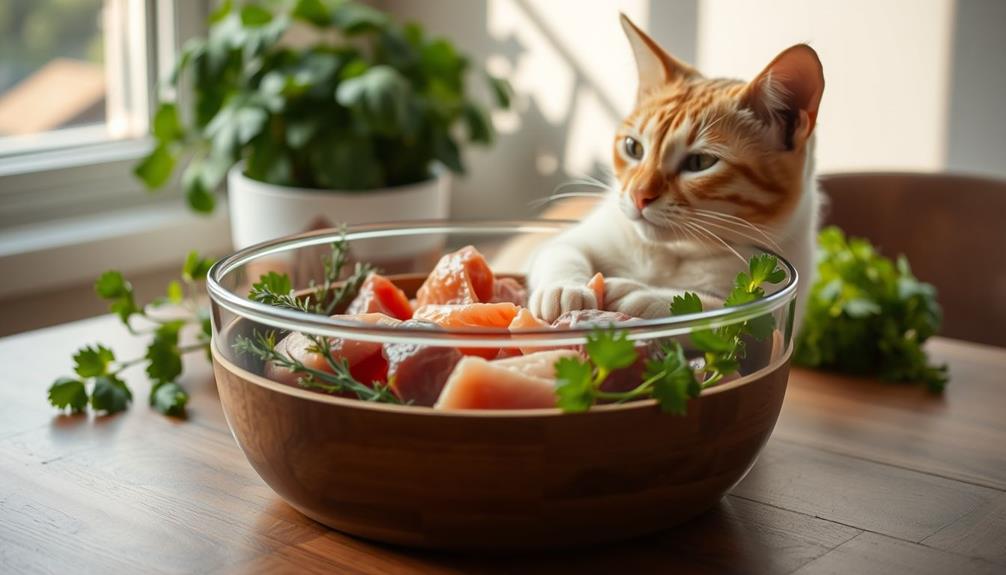
When you switch your cat to a raw diet, focus on enhancing hydration and selecting the right nutrient-rich ingredients.
Incorporating moisture-rich foods can promote better hydration, which is vital for managing urinary health. Additionally, opting for high-quality proteins can support your cat's overall well-being, as raw food diet benefits are numerous for pets.
It's important to implement gradual shift guidelines to prevent any digestive issues. By paying attention to these practices, you can help manage your cat's urinary health effectively.
Hydration Enhancement Techniques
A well-planned raw diet can greatly boost your cat's hydration levels, which is essential for preventing urinary crystals.
With a moisture content of 60-80%, raw food helps flush out minerals and reduce the risk of crystal formation. Additionally, a solid understanding of common financial terms can help pet owners budget for quality pet food.
Here are some effective hydration enhancement techniques to contemplate:
- Incorporate Raw Meat: Using various raw meats and organ meats promotes an acidic urine pH, which is beneficial in preventing struvite crystals.
- Mix with Wet Canned Food: Combining raw food with wet canned options increases moisture intake while providing essential nutrients.
- Diverse Protein Sources: Offering a variety of raw protein sources enhances palatability, encouraging your cat to eat more and stay hydrated.
- Regular Monitoring: Keep an eye on your cat's urine pH and hydration levels during the diet alteration to prevent potential health issues.
Nutrient-Rich Ingredient Selection
Selecting nutrient-rich ingredients is crucial for crafting a balanced raw diet that supports urinary health in cats. Focus on high-quality animal proteins, which are fundamental for maintaining muscle mass and preventing obesity—two critical factors for cats dealing with urinary crystals. Incorporate raw meat, organ meats, and bones to provide a balanced ratio of protein, fat, and moisture.
Additionally, understanding financial considerations for elderly care can be helpful for caregivers who may need to budget for their pets' dietary needs.
To further enhance urinary health, include omega-3 fatty acids from sources like fish. These fatty acids help manage bladder inflammation and support overall urinary tract function. Consider adding natural supplements like N-acetyl glucosamine (NAG), which can reduce bladder inflammation and create a healthier urinary environment.
Be mindful of magnesium and phosphorus levels in your ingredient selection. A diet low in these minerals can help prevent the formation of struvite crystals, which can complicate your cat's condition.
Gradual Transition Guidelines
To guarantee a smooth shift to a raw food diet, it's important to introduce the new food gradually, helping your cat adapt without digestive issues. This gradual transition is essential for maintaining emotional and psychological stability in your cat, similar to how key domains of development influence growth in children.
Start this gradual shift over a week or two, mixing small amounts of raw food with their current diet. Here are some key practices to follow:
- Begin with easily digestible proteins like chicken or turkey.
- Slowly increase the proportion of raw food while decreasing processed options.
- Monitor your cat's urine pH, as raw diets can promote more acidic urine, helping to dissolve struvite crystals.
- Schedule a vet consultation to guarantee nutritional needs are met.
As you shift, keep a close eye on how your cat responds to the new food. This gradual approach not only helps maintain a balanced diet but also allows you to identify any digestive issues early on.
Regularly monitoring your cat's urine pH during this period is essential, especially if they've a history of urine crystals. By taking these steps, you'll be setting your feline friend up for a healthier, happier life with a raw food diet.
Consulting Your Veterinarian
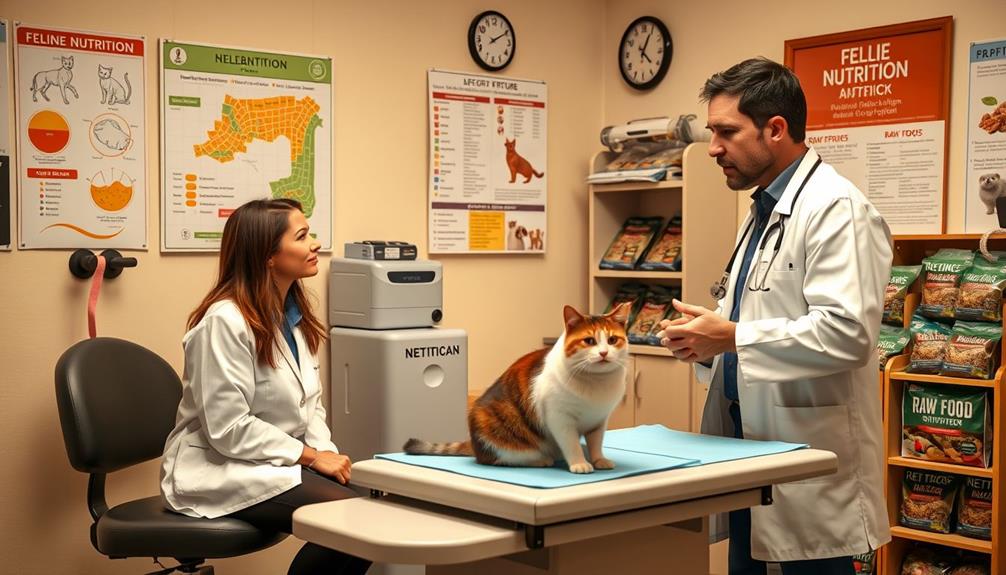
Before diving into a raw food diet for your cat, consulting your veterinarian is vital, especially if they've had urinary crystals in the past. Your vet can assess your cat's unique health needs and provide tailored dietary recommendations to guarantee the raw diet meets their specific nutritional requirements.
Changing to a raw diet without veterinary guidance can lead to complications, particularly for cats prone to urinary issues. Regular veterinary check-ups become significant in monitoring urinary pH levels and overall health during this shift.
Your veterinarian will help you track any changes and adjust the diet as needed. Discussing the potential risks and benefits of raw diets with your vet can clarify how this feeding approach may impact your cat's urinary health.
They can guide you on incorporating raw food safely, securing a balanced intake of key nutrients and proper hydration to minimize the risk of crystal formation.
In short, don't take the shift lightly. By consulting your veterinarian, you'll lay the groundwork for a healthier diet that supports your cat's well-being while addressing their urinary health concerns.
Frequently Asked Questions
Is a Raw Food Diet Good for Cats With Urinary Crystals?
A raw food diet might benefit your cat with urinary crystals. It increases hydration, promotes acidic urine, and can reduce crystal formation. Just monitor urine pH closely to avoid potential issues with calcium oxalate crystals.
What Is the Best Cat Food for Urine Crystals?
Picture a garden thriving after rain; that's how your cat's urinary health flourishes with the right food. Choose high-protein, moisture-rich options like wet food, and consider adding cranberries for extra support against crystals.
What to Feed a Cat With Crystals in Urine?
When you're feeding a cat with urinary crystals, focus on high-quality proteins and hydration. Consider a diet low in magnesium and phosphorus, and monitor their urine pH regularly to promote ideal urinary health.
What Is the Best Diet for a Cat With Urinary Problems?
To support your cat's urinary health, focus on a high-protein, moisture-rich diet. Incorporate quality animal proteins and guarantee hydration. Regular vet check-ups will help you tailor the best diet for their specific needs.
Conclusion
In summary, while raw food can offer benefits for cats with urinary crystals, it's essential to understand that not all raw diets are created equal. Experts emphasize the importance of nutritional balance and hydration, which are critical for urinary health. Remember, a well-rounded diet tailored to your cat's specific needs is key. Always consult your veterinarian before making any dietary changes to guarantee you're doing what's best for your furry friend's health.

